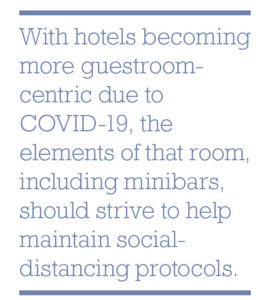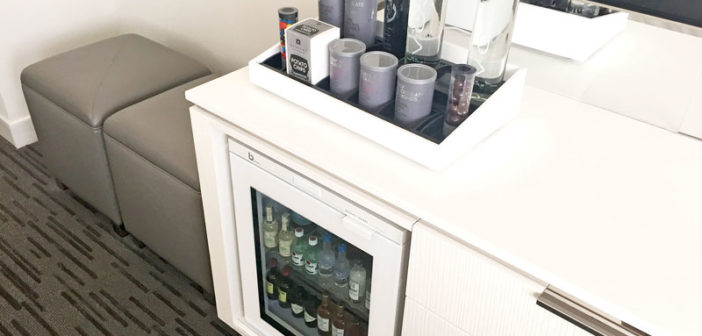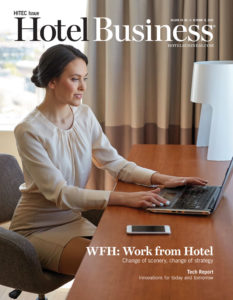LAS VEGAS—The COVID-19 pandemic has brought about many changes to the way hotels interact with guests.
Guests are now much less inclined to allow housekeeping to enter their rooms during their stays—and in some cases, it isn’t even an option—and may even prefer to stay in their rooms and avoid public areas as much as possible. As the industry becomes more “guestroom-centric” with hotel guests avoiding common areas like restaurants and bars, the in-room F&B offering has become a more central aspect of the stay experience.
But with limited entry allowed into rooms, keeping track of guests purchases from manual minibars can be a difficult task.
To help hotels with this situation, Bartech has unveiled Minibar+, a solution that enhances the company’s manual minibars with semi-automatic functionality. Simple to set up and implement, according to the company, Minibar+ is a “plug-and-play” solution that is available as a downloadable application, adding semi-automatic functionality to Bartech’s manual units to give hotel operators the ability to control key functions of these devices without having to set foot in the guestroom.
To address that need, Bartech’s Minibar+ supports hoteliers by creating guestroom-based profit centers using manual minibars or dry goods display units with sealed, pre-packaged goods, and allows remote monitoring and control of the units, allowing minimized guest contact.
“Minibar+ was created specifically as a means to provide more hoteliers with the ability to realign their offerings and revenue sources towards a more guestroom-focused approach. This is something that is crucial in today’s industry where many guests are limiting themselves from venturing into onsite public areas and with hotels restricting access to amenities such as restaurants and bars due to health safety concerns,” said Mario Agrario, CEO, Bartech. “However, while some properties may be able to seamlessly transition towards meeting guest expectations for contactless and convenient in-room purchase options via the presence of automated minibars, many may be equipped with manual platforms that lack the ability to provide for the efficient monitoring of maintenance and cleanliness needs.”
 He continued, “Minibar+ resolves this previously unaddressed issue by providing such hotels with the ability to convert their manual minibars into semi-automatic operations without requiring costly new hardware replacement and without the need to pay a recurring license fee.”
He continued, “Minibar+ resolves this previously unaddressed issue by providing such hotels with the ability to convert their manual minibars into semi-automatic operations without requiring costly new hardware replacement and without the need to pay a recurring license fee.”
The system also allows hoteliers to control costs by providing the ability to adjust internal temperatures remotely using tablets or smartphones. “By simply downloading and accessing the Minibar+ app on either a smartphone or tablet, hotel staff can gain remote control over key minibar functions to minimize the need to physically enter guestrooms while offering the opportunity to reduce related operational costs,” said Agrario.
The system also allows staff the ability to remotely lock and unlock minibars individually or by floor, reducing staff and guest pilferage, and allowing hoteliers to offer higher-quality items in the guestroom. Maintenance staff can also schedule defrost timing remotely.
The remote access helps maintain social-distancing protocols. “By allowing hotels to more effectively shift towards guestroom-centric experience strategies, Minibar+ maximizes opportunities to enhance social distancing efforts while still ensuring that suddenly arising guest needs can be safely met within the guestroom,” he said. “By providing remote control capabilities over temperature or defrost settings as well as the ability to lock or unlock minibar doors, Minibar+ significantly reduces the number of times that an employee is required to enter a specific room, which may risk bringing germs into the guestroom environment or may lead to unnecessary close contact between staff and guests. With Minibar+ also able to determine when a minibar door has been opened by guests, staff can also be alerted to the need to sanitize units along with any remaining items prior to any subsequent guest arrival to ensure that cleanliness requirements continue to be met.”
With all hotels looking to minimize expenditures, the new system can also reduce energy costs. “The remote abilities of Minibar+ not only serve to enhance cleanliness and revenue earning goals as previously mentioned, but can boost profits even further by reducing unnecessary energy consumption by each minibar unit without affecting service quality and without the need for staff to reduce social distancing efforts,” said Agrario. “By again using either a smartphone or a tablet, hotel staff can remotely control minibar temperatures and defrost settings which can be adjusted according to whenever a guestroom becomes vacant or occupied. Such abilities can also be preset to automatically adjust temperature during periods of low occupancy and can quickly translate into considerable cost savings.”
“A well-run minibar operation has always been one of the most profitable departments in the hotel,” he added. “With social distancing likely to remain a societal norm for some time, guestroom amenities are sure to experience a renaissance. It’s up to hotel operators to provide a quality stay experience, even if a guest never ventures out of their guestroom, and Minibar+ exists to make that possible.” HB


